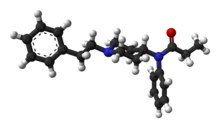Fentanyl
 | |
 | |
| Identifiers | |
|---|---|
| |
| ECHA InfoCard | 100.006.468 |
| Chemical and physical data | |
| Formula | C22H28N2O |
| Molar mass | 336.48 g·mol−1 |
| 3D model (JSmol) | |
| |
| (verify) | |
Fentanyl (sometimes spelled fentanil) is a synthetic opioid that is used as a painkiller. It also acts as a sedative. It has a short duration of action and works rapidly. The two most common forms are patches that are put on the skin, and an intravenous solution. Paul Janssen developed Fentanyl in 1960. It is about 120 times as potent as morphine; this means much less Fentanyl is needed to get the same effect.
The effects of the intravenous solution can be seen after three to five minutes. In about twelve hours, the concentration in the bloodstream will have halved.
Many deaths have resulted from its improper use.[1] Fentanyl has a relatively wide therapeutic index (270)[2] which makes it a very safe surgical anesthetic when monitored carefully. Because it is so potent, finding the right dose to use requires great care: Fentanyl comes as a highly diluted solution. There is also a powder, but its use is impractical without advanced scientific equipment: The effective dose needed and a lethal dose of fentanyl powder placed next to each other would be difficult or impossible to differentiate with the naked eye.
Non-medical use of fentanyl by people without opioid tolerance can be very dangerous and has resulted in many deaths.[3] Even people with opiate tolerance are at high risk of overdoses. Fentanyl is used as a recreational drug. This has led to thousands of overdose deaths each year from 2000 to 2015.[4][5] It is now the leading cause of death for young adults in the US. It is also the main cause of death in British Columbia for people aged between 10 and 59.[6]
Most of it comes from Mexico. As it is so powerful the quantities are very small. All the fentanyl needed to supply the US for a year weighs about 5 tonnes. This makes it hard to stop. Very few people are needed to make it. Heroin is not used so much now because fentanyl is more profitable. It has not spread much outside North America.[7]
Related pages[change | change source]
References[change | change source]
- ↑ Serna, Joseph; Karlamangla, Soumya. "Death toll rises to 9 in suspected fentanyl overdoses in Northern California". Los Angeles Times. Retrieved 2016-04-01.
- ↑ Stanley, Theodore Henry; Petty, William Clayton (1983-03-31). New Anesthetic Agents, Devices, and Monitoring Techniques. Springer. ISBN 978-90-247-2796-4. Retrieved 20 October 2007.
- ↑ "Fentanyl" (PDF). U.S. Drug Enforcement Administration. March 2015. Archived (PDF) from the original on 11 June 2016. Retrieved 2 June 2016.
- ↑ "'It is a huge issue': 145 fentanyl-related deaths in Alberta so far in 2015". globalnews.ca. August 11, 2015. Retrieved 16 November 2015.
- ↑ Vestal, Christine (1 April 2016). "As Fentanyl Deaths Spike, States and CDC Respond". Pew Charitable Trusts. Retrieved 13 July 2016.
- ↑ Goodwin, Karin (2023-10-19). "Karin Goodwin · Short Cuts: Vancouver's Opioid Crisis · LRB 19 October 2023". London Review of Books. Vol. 45, no. 20. ISSN 0260-9592. Retrieved 2023-10-17.
- ↑ Murray, Christine (2023-07-25). "How fentanyl changed the game for Mexico's drug cartels". Financial Times. Retrieved 2023-07-25.
